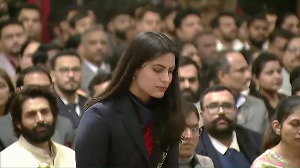The Great Indian Kitchen is one of the most powerful films Divya Nair has watched in recent times.
One that will unsettle you long after you've watched it.
And that's why everyone -- married or single, man or woman -- must watch it.

First of all, why is a film with a profound title like The Great Indian Kitchen not streaming on a popular platform?
If you haven't heard of this film yet, you have probably not even heard of the streaming platform -- Neestream -- either. In fact, it crashed multiple times during the screening, killing the experience for me.
But these technical glitches should not stop you from watching this important film because it tells the story of most Indian households.
It's a story attempted by several directors in different languages, but never treated with the same respect it should have been.
Directed by Jeo Baby, The Great Indian Kitchen, starring Suraj Venjaramoodu and Nimisha Sajayan, is about a young woman who is married into a prestigious family (tharavadu), the challenges she encounters and how she deals with them.
Like the film's title, her entire marriage somehow revolves around the so-called great Indian kitchen.
The 'loving' husband, played by Suraj, enters the kitchen for the first time after their wedding to cuddle up to her.
He leaves his cup there for her to clean up.
And never returns.
While the wife cuts, cooks, cleans everything in and around the house, the husband blissfully does yoga and teaches Class 11 students about the importance of family.
The new bride's ornaments are safely locked in a locker, just like her dreams and desires will be locked away, in the days to follow.
Every morning, the father-in-law slouches on the armchair reading the newspaper, waiting for his wife to hand him his toothbrush and paste (because he doesn't even know where it is), so he can finish this basic every day chore.
Both father and son need to have their dosas piping hot off the stove and religiously pair it with chutneys ground on ammi kal (not the mixer because taste suffers) and sambar, the mother-in-law educates the bride.
While the men relish their food and praise the women in delight, they carelessly leave behind the leftovers for their wives to clean up.
When the father is ready to step out, he calls out, more like a signal.
The mother will rush out to place his footwear in front of him so this grown up, entitled man can finally wear it and go wherever he has to.
Naturally, when Suraj's mother goes to visit her elder daughter who is expecting, Nimisha, who is probably just getting to know the family, is expected to take control of the house. This means doing everything she is not prepared or trained to handle -- from cooking on a wooden stove to manually grinding chutneys and washing clothes by hand.
She cannot make the job easier or save time by using a cooker, mixer or washing machine. Why? Simply because the interfering father of the house doesn't approve of it.
On the first day, when the father-in-law narrates the events to his wife over the phone, she casually even suggests 'onnu adjust cheythude?' (Why don't you adjust?) but is soon overpowered by the adamant husband: Please tell her (the daughter-in-law) not to cook rice in the cooker.
And you'll soon figure out it's less of a request, more like a warning.
Interestingly, both Nimisha and Suraj's characters don't have names. He calls her molu and she calls him ettan.
It's deliberate probably because there is nothing more significant about this relationship or marriage.
Ettan is too busy and entitled to send a plumber to fix the leaking basin, but he's not busy enough to demand sex from an exhausted molu every day.
Ettan doesn't follow table manners at home, but he knows exactly where to leave the crumbs when they dine at a fancy restaurant.
Ettan gets upset if molu brings up his poor table manners or if she goes against him and his father and applies for a job as a dance teacher. Why? Because, like FIL says, women are 'aishwaryam' of the house.
FIL boasts how women with post graduate degrees are doing a much significant job by taking care of the house (basically cook, clean and serve the men), which has enabled their sons and daughters pursue higher degrees and careers.
But aishwaryam here is subject to menstruation.
The same woman -- who cooks for 21 days of the week, manages every nook and corner of the house before lighting the pious lamp -- is ostracised during her period.
She has to sleep on the paaya (mat), not bed, can't enter the kitchen, should not dry her inner wear in sunlight or interact with anyone inside or outside the house.
'Why don't you stay in the outhouse or at some relative's place? What will I do with this bed that you have slept on (during your period)
And, of course, the sanitary pads have to be burnt after use to avoid sarpa kopam (wrath of the serpent god).
For a second, I thought people with corona were treated with better respect during their isolation.
But molu soon discovers that she has traded her life and freedom to be the wife to someone who doesn't understand the importance of foreplay before sex and treats his wife more like a bonded labourer.
Unlike in Thappad or the more recent Criminal Justice 2, Suraj's character never abuses the wife verbally or physically.
Yet, you can't ignore the subtle abuses and imprisonment Nimisha's character feels in the house.
And that's the beauty of it.
Even during the supposed act of pleasure at night, Nimisha's mind plays visuals of the overflowing sink, the dirty dishes and food waste from the kitchen she just finished cleaning. Because it's an image that's too powerful, disgusting and hard to shake off.
At least for her and for the viewer.
The characters never try to be preachy because the same incidents that disgust and stress Nimisha doesn't affect the maid Usha chechi or the aunt, who takes over the house while she is menstruating.
These women go about these chores like they are drinking tea.
But Nimisha's character feels suffocated just like the clogged drain the house.
She doesn't enjoy eating or cleaning leftovers.
She is an aware, empowered woman who knows that something is not right but is made to feel helpless.
When she informs Suraj that she's got her period, he starts a monologue about how she shouldn't enter the kitchen, who will manage the chores etc. She cuts him and says: Can you please get me a pad? I don't have one.
Of course, he wasn't expecting it.
Just like he wasn't expecting her to remind him about his poor table manners or about the importance of foreplay before sex.
And that precisely annoys his male ego.
There is nothing new or exceptionally different about this particular family or household, and most women who will watch the film may agree.
The situations may be varied, but the treatment is more or less the same -- entitled men who want to marry educated, affluent women but consciously or sub-consciously, confine them within the boundaries of marriage, clipping their wings and voices in the name of tradition and honour.
The women are expected to adjust, sacrifice or overlook while the men go about their lives and manners because ultimately 'my house, my convenience (my rules, too).'
But why do these women comply and not complain is completely left for the viewer to judge or understand.
What happens when women disrupt or question this convenience? They face consequences!
The timing of the Sabarimala verdict and the aftermath, also subtly referenced in this film, is a brilliant addition to the underlying theme of this film.
One of the best moments in the film is when Suraj's character asks Nimisha to pull down a Facebook post encouraging the Sabarimala verdict.
Since he is practicing abstinence to prepare for his pilgrimage, he stands outside the door and sternly tells her to pull it down without even looking at her.
Nimisha's response is unwavering: 'How does it affect you? And what will you even do? Can you even see or touch me now?'
And she slams the door on him.
There are several instances like these, where Nimisha fights back or attempts to, that will stay with you, that will, at least for a second inspire you to stand up for yourself.
Because she may not be right to some of you, but you can't stop her from thinking or having an independent opinion.
The takeaway may be different for each viewer.
The men and women may or may not agree with the treatment.
But it is one of the most powerful films I have watched in recent times that will unsettle you long after you've watched it.
And that's precisely why everyone -- married or single, man or woman -- must watch it.
The Great Indian Kitchen streams on Neestream.













 © 2025
© 2025